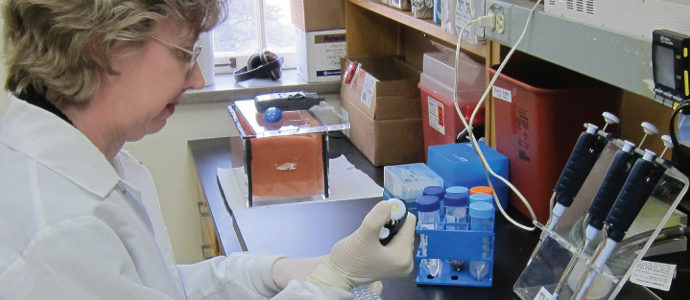This year’s Gordon Conference just finished, and Novartis presented their results for the first time (though advisors and advocates had been given a private peak months ago.) To say that the trial results for AFQ056 were disappointing would be the understatement of the century!
Read moremGluR5
Novartis Discontinues Development of mavoglurant (AFQ056) for Fragile X Syndrome
Novartis has announced that the company will be discontinuing its development program in Fragile X for its lead mGluR5 antagonist, mavoglurant (AFQ056), following negative results in a large international clinical trial in adults (reported in the Fall of 2013) and most recently, in a trial in adolescents. In both placebo-controlled trials, patients taking mavoglurant did not show improvement over placebo in any outcome measures. Novartis has also announced that the current open-label extension phase of the trial will be closed, but patients will be allowed to continue on the medication until their next scheduled clinic visit, or August 29, whichever comes first.
Read moreNew Clue to Fragile X and Autism Found Inside Brain Cells
Researchers led by Dr. Karen O’Malley at Washington University School of Medicine in St. Louis have published results of their work on mGluR5 and Fragile X syndrome. FRAXA Research Foundation provided funding for this work from 2009 until 2013. Pharmaceutical companies have developed therapeutic compounds to decrease signaling associated with the mGlu5 receptor, moderating its effects on brain cells’ volume knobs. But the compounds were designed to target mGlu5 surface receptors. In light of the new findings, the scientists question if those drugs will reach the receptors inside cells.
Read moreSocial Behavior as an Outcome Measure for Fragile X Clinical Trials

One of the features of the Fragile X mouse model which is relevant to the human Fragile X syndrome (and autism) is social behavior. Several tests show consistent social behavioral abnormalities in the Fragile X mouse model. With a $140,000 grant from FRAXA Research Foundation in 2012-2013, Dr. Willemsen at Erasmus University used social behavior tests to measure the effectiveness of several drug strategies.
Read moreGlycogen Synthase Kinase-3 (GSK3), Lithium and Fragile X

With $208,000 in funds from FRAXA Research Foundation, Dr. Richard Jope and his team at the University of Miami tested whether newly developed, highly specific inhibitors of GSK3 can reduce behavioral abnormalities in Fragile X mice.
Read moreEndocannabinoid Mediated Synaptic Plasticity in Fragile X Mice

With a $90,000 grant from FRAXA Research Foundation over two years, Drs. Olivier Manzoni and Daniela Neuhofer researched the relationship between Fragile X syndrome and the areas of the brain that are involved in reward processing, regulation of emotional behavior and emotional memory as well as attention, planning and working memory.
Read moreTargeting mGluR-LTD to Treat Fragile X Syndrome

With grants from FRAXA Research Foundation from 2000-2010, Dr. Kimberly Huber and her team at the University of Texas conducted several studies on the relationship between mGluR5 and Fragile X syndrome. Dr. Huber made the original discovery of the mGluR Theory of Fragile X when she was a postdoctoral fellow in the lab of Dr. Mark Bear, with her first FRAXA grant in 2000.
Read moreSmall Rho GTPases, a Potential Therapeutic Target for Fragile X Syndrome

With $384,345 in grants from FRAXA Research Foundation, Dr. MariVi Tejada from the University of Houston focused on a particularly promising point of intervention in pathways of brain receptors, and tested several potential therapeutic compounds in an attempt to rescue function in the mouse model of Fragile X.
Read moreEvaluation of CamKII Dependent Regulation of mGluR5-Homer Scaffolds as a Potential Therapeutic for Fragile X Syndrome

With a $90,000 grant from FRAXA Research Foundation, Dr. Kimberly Huber and Dr. Weirui Guo at the University of Texas at Southwestern investigated the roles of Homer and CaMKII in Fragile X syndrome.
Read moreAb-Mediated Translation in Fragile X Syndrome

With a $120,000 grant from FRAXA Research Foundation during 2011-2012, Dr. Cara Westmark at the University of Wisconsin explored the role of AbPP as a potential treatment option for fragile X. AbPP produces b-amyloid which is over-expressed in Alzheimer’s disease (AD) and Down syndrome.
Read moreWhat Works, and What Doesn’t
At the start, it’s always hard to know what methods will work best for something as complex as the development of disease-modifying treatments for Fragile X. But, we’ve always tried to let the science lead us down the right path. At this point, the results are unequivocal, and they have shaped how we are looking for the Next Great Thing in Fragile X treatments.
Read moreReward Function in Fragile X Syndrome

With a $82,500 grant from FRAXA Research Foundation in 2011-2012, Dr. Christopher Cowan and Dr. Laura Smith explored the role of specific signaling pathways in drug-related behavioral deficits, including determining the role, if any, of known impairments in the Fragile X brain.
Read moreA Metabolomic Drug Efficacy Index to Test Treatments in the Fragile X Mouse

Dr. Davidovic has been examining changes in metabolism in various brain regions that are affected in Fragile X patients. She has defined a brain-specific metabolic signature of FXS and is testing treatment strategies to restore normal levels of these metabolites.
Read moreCompound that Inhibits mGluR5 Corrects Signs of Fragile X in Adult Mice
A study finds that a new compound reverses many of the major symptoms associated with Fragile X syndrome (FXS). The paper is published in the April 12 issue of the journal Neuron, describing the exciting observation that the FXS correction can occur in adult mice, after the symptoms of the condition have already been established. Previous research has suggested that inhibition of mGlu5, a subtype of receptor for the excitatory neurotransmitter glutamate, may ameliorate many of the major symptoms of the disease. This study, a collaboration between a group at Roche in Switzerland, led by Dr. Lothar Lindemann, and Dr. Mark Bear’s MIT lab, used an mGlu5 inhibitor called CTEP to examine whether inhibition of mGlu5 could reverse FXS symptoms.
Read moreRole of JNK in FMRP Regulated Translation in Fragile X Syndrome

With a $90,000 grant from FRAXA Research Foundation over 2 years, Dr. Michael Wilhelm and his team at the University of Wisconsin studied a protein known as JNK, which is observed to be abnormally regulated in Fragile X. Like FMRP, it is involved in regulating dendritic protein synthesis, and so it may be a target for drug therapy in Fragile X.
Read moreRole of Excessive Protein Synthesis in the Ontogeny of FXS

With a $90,000 grant from FRAXA Research Foundation in 2010-2011, Dr. Mark Bear and Dr. Miquel Bosch tested the simple hypothesis that the excessive rate of protein synthesis is not a consequence but the primary cause of the structural alterations occurring in Fragile X syndrome.
Read moreClinical Trials Outcome Measures

With $281,824 in funding from FRAXA Research Foundation from 2002-2011, Dr. Berry-Kravis at the Rush University Medical Center attempted to validate a new automated video tracking system for quantifying physical activity as an outcome measure for Fragile X clinical trials.
Read moreManipulating Basal and mGluR-Stimulated cAMP Level in FXS Model Mice

With a $90,000 grant from FRAXA Research Foundation, Dr. Hongbing Wang’s team from Michigan State University looked at a treatment target “downstream” of the mGluR5 called cyclic AMP (cAMP). Levels of cAMP are lower in FXS patients and animal models, suggesting that it plays a role in FXS. Drugs that raise levels of cAMP may effectively treat Fragile X. We are very pleased to report that, in 2012, Dr. Wang received a 5-year, $250,000 per year R01 grant from NIH to continue this promising research.
Read moreEncouraging Results from First Trial of Minocycline in Fragile X

With a $40,000 grant from FRAXA, Dr. Carlo Paribello and his team at the Surrey Place Centre Fragile X clinic in Toronto, Ontario, ran an open label trial to see if minocycline can improve learning and reduce anxiety and behavioral problems in people with Fragile X. Twenty participants between the ages of 13 and 35 years took minocycline for two months.
Read moreThe Role of FMRP and Small, Non-Coding RNAs in Translation

With a $120,000 grant from FRAXA Research Foundation, Drs. Henri Tiedge and Jun Zhong studied the mechanisms by which local protein translation is repressed. Multiple parallel mechanisms keep protein synthesis in check; one of them involves FMRP, and a similar mechanism involves the non-coding RNA, BC1. Results published.
Read moreResults of First Fenobam Trial in Adults with Fragile X Published
We are pleased to announce the publication of positive results of a Phase IIa clinical trial of fenobam in Fragile X. Fenobam belongs to a class of compounds known as mGluR5 antagonists. Neuropharm, a specialty pharmaceutical company based in the U.K., received Orphan Drug Designation in the US in 2006 for fenobam in the treatment of Fragile X, after acquiring rights to relevant data on the compound from FRAXA. This trial was conducted in the US by Drs. Randi Hagerman of the UC Davis MIND Institute and Elizabeth Berry-Kravis of the RUSH University Medical Center, and initial results were first announced last summer.
Read moreRole of the Cerebellum in the Dysfunction of Fragile X Syndrome

Correcting Fragile X Syndrome Deficits by Targeting Neonatal PKCε Signaling in the Brain Ben A. Oostra, PhD Principal Investigator Erasmus University Rotterdam, The Netherlands 2004-2005 Grant Funding: $119,000 Summary The Dutch-Belgian Fragile X Consortium led by Dr. Oostra created the
Read moreImaging Synaptic Structure and Function in Fragile X Mice

FRAXA Research Foundation grants $150,000 over 2005-2009 to Dr. Carlos Portera-Cailliau to study intact, anesthetized Fragile X mouse brains, looking for defects in the density, length, or dynamics of the dendrites. They looked for changes in the neurons after treatment with mGluR5 antagonists.
Read more3 Researchers Honored at FRAXA Investigators Meeting
Over 150 scientists from around the globe gathered in Durham, New Hampshire, for FRAXA Research Foundation’s Investigators Meeting on September 21-24, 2008. They came from Australia, Canada, India, Turkey, the U.S., and eight European countries. Their common goal: “to share, collaborate and publish,” in the words of FRAXA’s Medical Director, Michael Tranfaglia, MD, to find effective treatments and a cure for Fragile X, the foremost inherited cause of mental retardation and autism. Most of the attendees were university-based professors, postdoctoral fellows, and graduate students who have FRAXA research grants. Also participating in the meeting were scientists from the National Institutes of Health (NIMH, NICHD, and NINDS), Neuropharm Group PLC, Hoffman LaRoche Inc., GlaxoSmithKline, Indevus, and Seaside Therapeutics, as well as 20 parents of Fragile X children.
Read moreGlutamate Metabolism in Fragile X Mouse Brain

With a $95,000 grant from FRAXA Research Foundation over 2 years, Mary McKenna at the University of Maryland studied the role of metabotropic glutamate receptors (mGluR) and how they affect other cells and pathways.
Read more